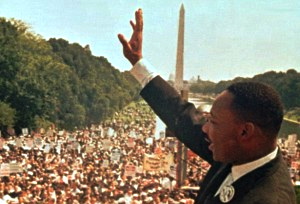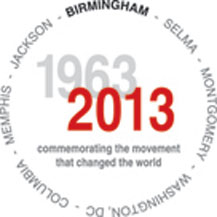The Misremembering of ‘I Have a Dream’

The Misremembering of ‘I Have a Dream’
 In this Aug. 28, 1963 file photo, Dr. Martin Luther King Jr. acknowledges the crowd at the Lincoln Memorial for his “I Have a Dream” speech during the March on Washington. (AP Photo/File)
In this Aug. 28, 1963 file photo, Dr. Martin Luther King Jr. acknowledges the crowd at the Lincoln Memorial for his “I Have a Dream” speech during the March on Washington. (AP Photo/File)
Adapted from The Speech: The Story Behind Martin Luther King Jr.’s Dream, by Gary Younge. (Haymarket Books)
When Dr. Martin Luther King Jr. took the podium on August 28, 1963, the Department of Justice was watching. Fearing that someone might hijack the microphone to make inflammatory statements, the Kennedy DOJ came up with a plan to silence the speaker, just in case. In such an eventuality, an official was seated next to the sound system, holding a recording of Mahalia Jackson singing “He’s Got the Whole World in His Hands,” which he planned to play to placate the crowd.
 Half a century after the March on Washington and the famous “I Have a Dream” speech, the event has been neatly folded into America’s patriotic mythology. Relatively few people know or recall that the Kennedy administration tried to get organizers to call it off; that the FBI tried to dissuade people from coming; that racist senators tried to discredit the leaders; that twice as many Americans had an unfavorable view of the march as a favorable one. Instead, it is hailed not as a dramatic moment of mass, multiracial dissidence, but as a jamboree in Benetton Technicolor, exemplifying the nation’s unrelenting progress toward its founding ideals.
Half a century after the March on Washington and the famous “I Have a Dream” speech, the event has been neatly folded into America’s patriotic mythology. Relatively few people know or recall that the Kennedy administration tried to get organizers to call it off; that the FBI tried to dissuade people from coming; that racist senators tried to discredit the leaders; that twice as many Americans had an unfavorable view of the march as a favorable one. Instead, it is hailed not as a dramatic moment of mass, multiracial dissidence, but as a jamboree in Benetton Technicolor, exemplifying the nation’s unrelenting progress toward its founding ideals.
Central to that repackaging of history is the misremembering of King’s speech. It has been cast not as a searing indictment of American racism that still exists, but as an eloquent period piece articulating the travails of a bygone era. So on the fiftieth anniversary of ”I Have a Dream,” “Has King’s dream been realized?” is one of the two most common and, to my mind, least interesting questions asked of the speech; the other is “Does President Obama represent the fulfillment of King’s dream?” The short answer to both is a clear “no,” even if the longer responses are more interesting than the questions deserve. We know that King’s dream was not limited to the rhetoric of just one speech. To judge a life as full and complex as his by one sixteen-minute address, some of which was delivered extemporaneously, is neither respectful nor serious.
Regardless, any contemporary discussion about the legacy of King’s “I Have a Dream” speech must begin by acknowledging the way we now interpret the themes it raised at the time. Words like “race,” “equality,” “justice,” “discrimination” and “segregation” mean something quite different when a historically oppressed minority is explicitly excluded from voting than it does when the president of the United States is black. King used the word “Negro” fifteen times in the speech; today the term is finally being retired from the US Census as a racial category.
Perhaps the best way to comprehend how King’s speech is understood today is to consider the radical transformation of attitudes toward the man who delivered it. Before his death, King was well on the way to being a pariah. In 1966, twice as many Americans had an unfavorable opinion of him as a favorable one. Life magazine branded his anti–Vietnam War speech at Riverside Church “demagogic slander” and “a script for Radio Hanoi.”
But in thirty years he went from ignominy to icon. By 1999, a Gallup poll revealed that King was virtually tied with John F. Kennedy and Albert Einstein as one of the most admired public figures of the twentieth century among Americans. He ranked as more popular than Franklin Delano Roosevelt, Pope John Paul II and Winston Churchill; only Mother Teresa was more cherished. In 2011, a memorial to King was unveiled on the National Mall, featuring a thirty-foot-high statue sited on four acres of prime cultural real estate. Ninety-one percent of Americans (including 89 percent of whites) approved.
This evolution was not simply a matter of ill feelings and painful memories eroding over time. It was the result of a protracted struggle that sheds light on how the speech for which he is best known is today understood. The bill to establish King’s birthday as a federal holiday was introduced just a few days after his death, with few illusions as to its likely success. “We don’t want anyone to believe we hope Congress will do this,” said union leader Cleveland Robinson at a rally with King’s widow in 1969. “We’re just sayin,’ us black people in America just ain’t gonna work on that day anymore.”
Congress would pass the bill, but not without a fight. In 1983, the year Ronald Reagan grudgingly signed Martin Luther King Day into law, he was asked if King was a communist sympathizer. “We’ll know in thirty-five years, won’t we?” he said, referring to the eventual release of FBI surveillance tapes.
Gary Younge, the Alfred Knobler Journalism Fellow at The Nation Institute, is the New York correspondent for the Guardian and the author of The Speech: The Story Behind Dr Martin Luther King Jr.’s Dream (Haymarket). His previous books include Who Are We—And Should it Matter in the 21st Century? (Nation Books), Stranger in a Strange Land: Travels in the Disunited States (New Press), and No Place Like Home: A Black Briton’s Journey Through the Deep South (Mississippi).
http://www.thenation.com/article/175764/misremembering-i-have-dream


